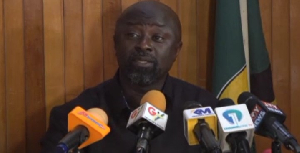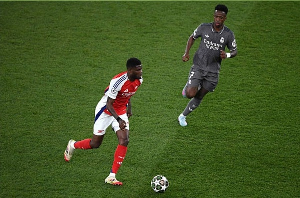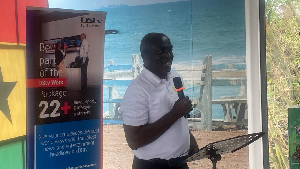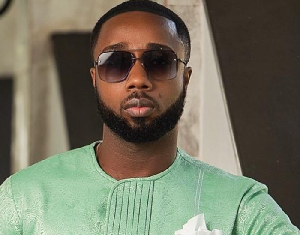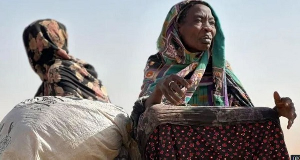As most of us know or should know, present day Ghana was known as the Gold Coast during the pre-independence era. The name Ghana was adopted at the time of independence from Britain in 1957. According to some historical documents and other publications the Republic of Ghana is named after the medieval Ghana Empire of West Africa. The actual name of the Empire was Wagadugu.
Ghana was the title of the kings who ruled the kingdom. It was controlled by Sundiata in 1240 AD, and absorbed into the larger Mali Empire. (Mali Empire reached its peak of success under Mansa Musa around 1307.) Geographically, the old Ghana is 500 miles north of the present Ghana, and occupied the area between Rivers Senegal and Niger.
Some inhabitants of present Ghana had ancestors linked with the medieval Ghana. This can be traced down to the Mande and Voltaic people of Northern Ghana--Mamprussi, Dagomba and the Gonja. Anecdotal evidence connected the Akans to this great Empire. The evidence lies in names like Danso shared by the Akans of present Ghana and Mandikas of Senegal/Gambia who have strong links with the Empire.
If this historical take on the origins of the name Ghana is correct, then in theory, if we wished to be associated with that former Empire, perhaps a more appropriate name for present day Ghana would have been Wagadugu and we should all then be known as Wagadugans. After all, if the basis for changing the previous name we had, Gold Coast, was to associate ourselves with an African empire and its supposed glories, then Wagadugu would be more consistent with that goal.
We can also agree that using the title of the Kings who ruled the Kingdom as the name of a country and of a people would be akin to calling the Ashanti, Otumfuor and the Ashantis, the Otumfuors which makes very little sense. All of this would argue for revisiting the name Ghana.
It would seem that those who chose the name Ghana to replace the Gold Coast appear to have been historically illiterate at the very least, if we are to believe the citation above. As I recall, this name change was never endorsed by the people of the Gold Coast through a referendum at the time it was done. My guess is that it was chosen by Prime Minister Kwame Nkrumah. Perhaps it was discussed at a Cabinet meeting and agreed upon by his Ministers, and perhaps it was not. What I do know is that the majority of the people of the then Gold Coast had no say in the matter whatsoever.
Now, to be blunt, I do NOT fancy being called a Wagadugan and very much doubt that many Ghanaians would warm to that name, not to mention the fact that the present capital of Burkina Faso is called Ouagadougou and such a name change would lead to nothing but confusion. There is enough confusion now between “Nigerian” and “Nigerien” and we do not need to add to it.
If Wagadugu was the only alternative to Ghana, I would plead with all to keep the Ghana designation in spite of its historical frailties. It does have a nice, neutral and a sophisticated ring to it. When I am called a Ghanaian, I feel a sense of pride that a good sounding name can give you for the same reason that actors and actresses in Hollywood change their names. Your name can make or break you.
It appears then that based on a very tenuous link to an empire somewhere in West Africa, quite far from present day Ghana, I might add, we shed the name Gold Coast and became Ghana. The argument for this change, as I understood it at the time was that Gold Coast was a name given to us by the colonialists and imperialists and it was time to pick something African.
So we shed one name given to us by the European imperialists and adopted one associated with African imperialism. The irony apparently was lost on the proponents of this change and we have embraced it and made it our own without further thought.
Considering Ghana’s auspicious role in the fight against European imperialism in Africa, one would think the last thing we would do is embrace any other form of imperialism. Apparently those who decided to change the name of the Gold Coast to Ghana must have felt that while European imperialism was abhorrent, African imperialism was to be cherished.
I would suggest that it is time to seriously consider going back to the name Gold Coast, or as I will suggest later in this article, perhaps a variation of it.
The name Gold Coast may have first been used by the Europeans to describe this region of West Africa, but it is an accurate and fact-based description. Ghana is still one of the largest producers of gold in the world and clearly, the term is not pejorative.
If we were called the Slave Coast, for example, as a wide swath of West Africa was called, it would make perfect sense to renounce the name even if it was factually accurate.
The fact is that the name Gold Coast, which we have abandoned, when considered absent the d colonial taint, has a nice, romantic ring to it. It conjures up a land of shimmering beauty, of warm sunny days and of glistening oceanic waves.
Countries that have any association with gold embrace and make it part of their image. California is known as the Golden State and Californians are proud of that. The major highway running up and down the spine of California is called the Golden State Freeway and is more likely to be called by that name than the unromantic, generic Interstate 5.
In addition to the beauty of the Gold Coast name, people outside of Africa have tended to confuse Ghana with other countries and places with similar sounding names. During the reign of Idi Amin, I was constantly having to explain to people that no, I was not from U-ganda. A telephone operator once told me when I tried to call Ghana in the days before direct dial became common, that I did not need to pass the call through her, because Gardner, a city in Massachusetts, was just around the corner from where I lived. And I have lost track of the number of times I was almost booked on flights to Guyana when all I wanted to do was go to Ghana.
Just as I would not want to be constantly called by somebody else’s name, being confused with other countries has negative effects that are easy to see but hard to quantify.
The main problem I see with my proposed name change is losing the “Ghanaian” tag. We should congratulate the inventor of that moniker. We could very easily have been called “Ghanans”, possibly “Ghananese” or “Ghanese” both of which sound like a shortened form of the word Manganese. Worse yet we could have been called “Ghanites” or “Ghananites” which sound like the ingredients for making a bomb.
Our Nigerian friends have been known to call us Ghana-nians” which I suspect is their way of getting under our skin considering the competitive nature of the relationship between the two countries. So, all in all, we should be grateful that we got the more elegant “Ghanaian” instead.
It certainly sounds much better than all of the above possibilities and I would grant, much, much better than “Gold Coaster”. “Gold Coaster” feels a bit heavy off the tongue and a little bit unimaginative.
Perhaps a compromise on the new name for Ghana might be to change the name to “Goldland”. This is consistent with the names of lots of countries. We have countries such as Ireland, England, Scotland and Swaziland, so we would be following a well-worn convention for naming countries. “Goldland” is also much more inclusive than Gold Coast since Ashanti where most of our gold comes from is not on the coast. “Goldland” will thus embrace all, from the coastal plains of Accra to the northern border regions. We can then become “Goldlanders” which sounds pretty good to me.
Other possibilities, though, could be “Goldenites” or perhaps “Goldenese”. No matter what we choose to do, however, we should try to resurrect the Gold Coast name from the dustbin of history where it now languishes.
We could use it in tourist brochures describing our beautiful land or as part of the name for fancy nightclubs and restaurants off our breezy, sandy beaches.
We will then once again claim this glorious name that we so carelessly, and, yes, so thoughtlessly threw away so long ago. And with the change in name to Goldland, I can finally fly home without risking ending up in Guyana.
Opinions of Friday, 25 August 2017
Columnist: Joseph O Cruickshank



